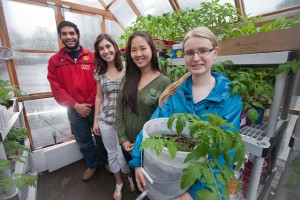Six students are working to green up the plates of the Easton community, using a variety of innovations to make vegetable-growing possible within limited green space.

Asad Akram 13 (l-r), Alexandra Behette '13, Helen Xu '14, and Julia Seidenstein '14 in Easton Area Community Center’s greenhouse
The team is working as part of Technology Clinic, a hands-on course that brings students from different majors together to help solve real-world problems. This semester, the group focused on increasing the availability of fresh vegetables in Easton’s West Ward neighborhood.
The students are Asad Akram ’13 (Lahore, Pakistan), a chemical engineering major; Alexandra Behette ’13 (Neshanic Station, N.J.), a government and law major; Xiao Cui ’13 (Beijing, China), a double major in economics and international affairs; Gregory Troutman ’13 (Columbia, Pa.), a neuroscience major; Julia Seidenstein ’14 (Lawrenceville, N.J.), a geology major; and Helen Xu ’14 (King Of Prussia, Pa.), a chemical engineering major.
Under the leadership of advisers Lawrence Malinconico, associate professor of geology and environmental geosciences, and Dan Bauer, professor emeritus of anthropology and sociology, the students came up with ideas for grappling with the “food desert” status of the West Ward.
A food desert is an area in which a substantial number of residents have limited access to a supermarket or a large grocery store. While the West Ward has many corner stores, the nearest grocery store is out of reach of many residents. This means that fresh vegetables are scarce.
Inspired by the several community gardens that have sprung up in Easton, the Tech Clinic partnered with Easton Area Middle School to plant a pizza garden on school grounds in March. Lafayette came with the seeds and potting soil, while Shay Miller, a consumer science teacher at the middle school, collected old egg cartons, used coffee cans, and empty yogurt containers in which to plant the seeds.
The middle school students planted vegetables that would taste good on a pizza, like tomatoes and peppers. The seedlings were eventually transplanted into five-gallon buckets. When the plants are ready to harvest, there will be a pizza party in which the kids top their pizzas with their own vegetables.
In April, the Tech Clinic worked with the Easton Area Community Center (EACC) to throw a “bucket gardening” event. Because green space in the West Ward is limited, the Tech Clinic brainstormed methods of growing vegetables in small spaces. Hence, bucket gardening: The students altered buckets donated from Sodexo, the Easton Baking Company, and DeLorenzos Restaurant to include water reservoirs at the bottom, soil space in the middle, and proper drainage using recycled milk jugs.
At the event, local children were excited both to construct and decorate their bucket gardens.
“The idea is that the kids will soon be able to take them home,” says Seidenstein, noting that the buckets can be kept outside on a front porch. “We want to be able to set up a system where the buckets are reused every year, so hopefully next summer, even when the Tech Clinic is not involved, they’ll still have bucket gardens.”
“That’s one of the things that’s very important with these projects: to try to work in the idea of sustainability,” says Malinconico, who wants the Tech Clinic students to create a “cookbook” with the instructions and costs of creating bucket gardens and pizza gardens. He adds that this project is a little different than any the Tech Clinic has ever completed.
“Often times, in the first semester, it’s a lot of brainstorming and finding imaginative solutions,” he says. “With this project, because it’s dependent upon a growing season which started a couple of weeks ago, we had to hit the ground running.”
This summer, Seidenstein, Akram, and Troutman will continue to work on the project, holding another planting day, a garden day, and other events. The students will also experiment with a “vertical garden” using pallets at the EACC and begin to evaluate the effectiveness of their efforts.
Seidenstein says a big part of the Tech Clinic is having students of different academic backgrounds, who bring a variety of skills to the table.
“People are interested in different things in the project, and it keeps everyone else going,” she says.

2 Comments
Great project. Gardening and fresh produce are an excellent place to start to alleviate the “food desert.” It would also be wonderful to see Lafayette students involved in whatever it would take to get a grocery store to locate in the West Ward.
see more at http://www.fooddeserts.org
Comments are closed.